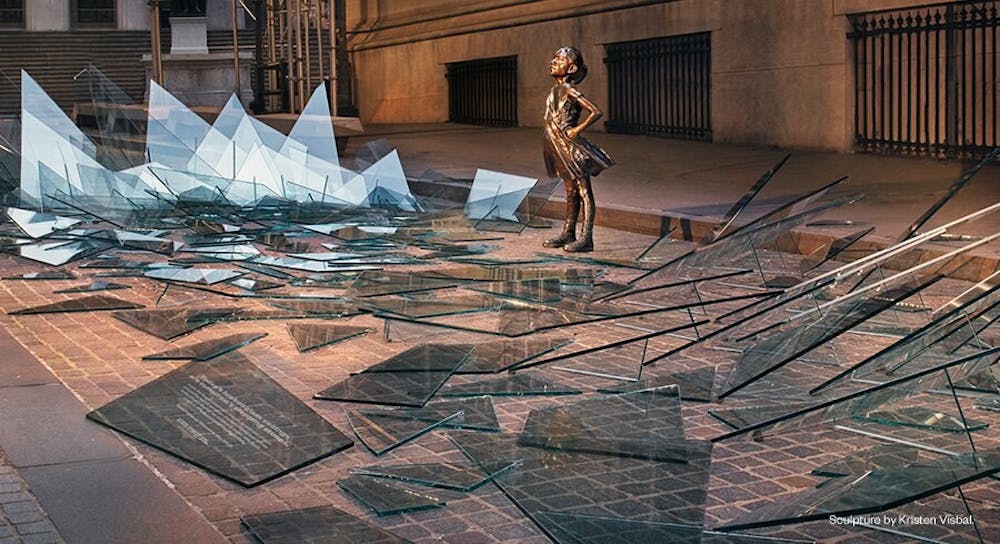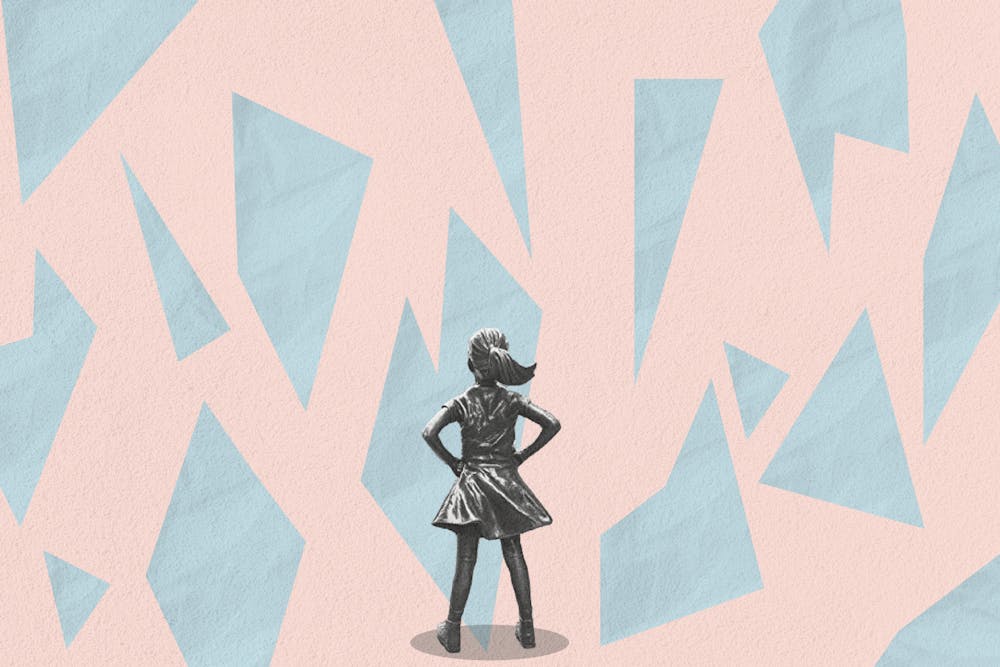In 2017, investment management company State Street Global Advisors (SSGA) placed the prominent Fearless Girl statue in New York's Financial District. With her hands on her hips and chin raised high, the Fearless Girl squarely faces the Charging Bull, another famous Wall Street statue that represents the supposed pinnacle of corporate grit and success: the American Dream. When the Fearless Girl was first installed the night before International Women’s Day, it was quickly lauded on social media as the symbol of modern–day feminism. Now, four years later, the statue has once again been remodeled to mark the international holiday.
The Fearless Girl has since been moved in front of the New York Stock Exchange, where she used to be surrounded by shards of broken glass to symbolize the “many glass ceilings women have shattered.” For SSGA, the installation of the Fearless Girl was ultimately an act of self–promotion under the guise of a political message. In 2017, they utilized the statue to market their exchange–traded fund called SHE, an index fund that invests in companies with gender–diverse leadership. Ironically, SSGA later faced backlash for the lack of diversity on their own leadership boards and their settlement of a lawsuit that showed signs of the company systematically underpaying their female and Black employees.

Apart from these discrepancies, the Fearless Girl ultimately represents the hollowness of the feminism it promotes. The statue serves as a visualization of how women 'breaking the glass ceiling' is perceived as inherently feminist. Climbing up the corporate ladder, attaining high positions of leadership in finance companies, and being your own boss is viewed as the epitome of female empowerment. While having women in positions of power is important, who does it come at the expense of? Does it 'trickle down' to all those who are victims of misogyny and the patriarchy? Which groups are excluded from the conversation of mainstream feminism and its goals that only seek to benefit the most privileged?
Akin to the lukewarm messaging of SSGA’s own gender diversity initiatives, glass–ceiling feminism is seen as more acceptable because it doesn’t seek to dismantle what feminist writer bell hooks describes as the “imperialist, white–supremacist, capitalist patriarchy.” At its core, glass–ceiling feminism doesn’t challenge the status quo—it sustains it. In the name of equality, women are told to merely “lean in" to the capitalist patriarchy to achieve individualistic financial success.
Excluded from the conversation is any analysis of race, class, gender, sexuality, and other forms of marginalization. This phenomenon, however, is unfortunately not new in white feminist discourse. The racism of notable suffragists such as Susan B. Anthony and Elizabeth Cady Stanton illustrates how white supremacy permeates political movements, even ones that tout equality. Despite companies and celebrities often leveraging feminist language, they can also be complicit in harming and marginalizing other women.
For example, Miki Agrawal, co–founder of the period underwear company THINX, worked against the very feminist values that her company claimed to support. Reports were filed against her for the exploitation of workers with low pay and substandard benefits, antagonism towards salary negotiations, toxic workplace culture, and multiple reports of sexual harassment. The long list of Agrawal’s heinous behavior was disclosed by dozens of her own employees—mostly women.
All of this underscores the necessity of intersectionality, a term coined by lawyer and civil rights advocate Kimberlé Crenshaw. Crenshaw describes intersectionality as “a lens, a prism, for seeing the way in which various forms of inequality often operate together and exacerbate each other.”
Glass–ceiling feminism ultimately fails to account for the privileges that make it possible to break through the glass ceiling of corporate America. Companies' calls for diversity and inclusion are hollow if there are no efforts to dismantle the societal structures that exclude and marginalize these groups in the first place. Feminism means actively rejecting misogyny and patriarchy, and listening to and centering the experiences of BIPOC women, trans women, disabled women, and other marginalized communities in the feminist movement. More than just shattering the glass ceiling, feminism is a movement towards gender equity and our collective liberation.

